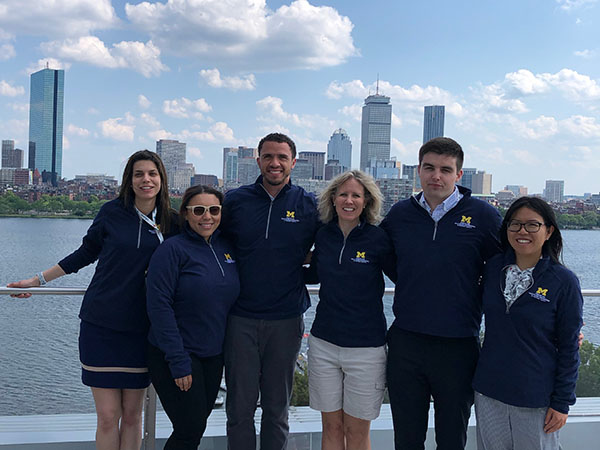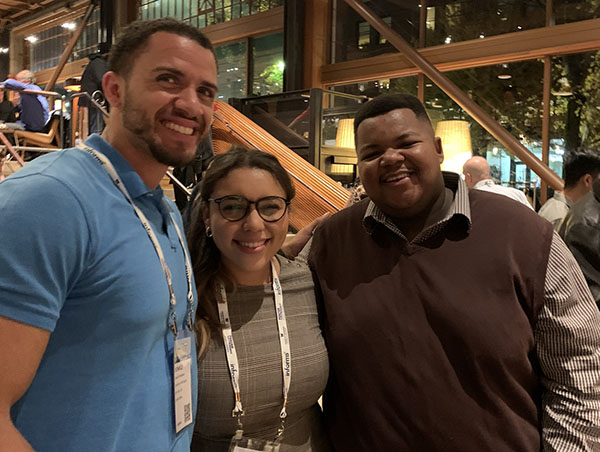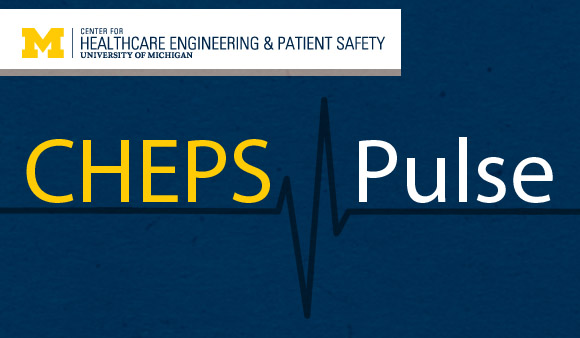In This Issue
- COVID-19 Response
- CHEPSter to CHEPSter: The Power of Building Relationships
- Recent News
- Congratulations Graduates
Responding to COVID-19
We hope you are safe, healthy, and finding your balance in these uncertain times. We know the COVID-19 situation makes it hard to keep up with all the changes at the University and beyond. The University of Michigan’s COVID-19 page provides valuable and timely information. The College of Engineering has also created a one-stop page for University of Michigan Engineering faculty, students and staff.
As we are able, we’ll share with you some of what CHEPSters are doing to help the COVID-19 response. Most recently, CHEPS Associate Director Amy Cohn was a member of the team that published a paper titled “Variation in Aerosol Production Across Oxygen Delivery Devices in Spontaneously Breathing Human Subjects.”
Many CHEPS students have been involved in our COVID-19 project including Carolyn Wu and Samir Agarwala who have been providing Professor Cohn with daily updates on all things COVID-19.
Additionally, a group from CHEPS helped launch the Internal Medicine Family Support Network to help practitioners in Internal Medicine find help with things like grocery shopping and childcare as they are working long hours due to COVID-19.
CHEPSter to CHEPSter: The Power of Building Relationships
An Interview With Donald Richardson
by Amanda Moreno-Hernandez
Editor’s note: Amanda interviewed Donald in February of 2020 while she was working at CHEPS and job hunting. She is now a Research Associate at the William Davidson Institute at the University of Michigan.
In the summer of 2017, I got into the Summer Research Opportunity Program (SROP) offered by Rackham to work with Professor Joi Mondisa from the Industrial and Operations Engineering (IOE) Department. Before attending the program, I attended the Institute of Industrial and System Engineers (IISE) Annual Conference in Pittsburgh. There I attended one of the talks and Donald Richardson presented part of his work. At the end of the session, I went up to him to introduce myself and ask if by any chance he had ever heard of SROP and if he had any advice for me. Little did I know, he was part of the program a while back. That summer I learned about the Center for Healthcare Engineering and Patient Safety (CHEPS) and got curious. I applied to the IOE master’s program and made my interest to work with Professor Amy Cohn very clear. Lucky me, a new project was rising, and Amy saw the potential in me to trust me with the lead of the Cardiac ICU project. But guess what? Donald was assigned to my team and became my mentor. I have learned so much from Donald, but the number one lesson is the power of building relationships and maintaining them. As my master’s program came to an end, I turned to him for advice on how to prepare myself for the “real world.”
Donald Richardson, Ph.D. is a recent graduate from the IOE Doctoral Program at the University of Michigan. With CHEPS Associate Director Amy Cohn as his advisor, he defended in June 2019. His thesis work focused on improving make-ahead chemotherapy drug policies to reduce patient waiting time at an outpatient chemotherapy infusion center. As a math major from the University of Maryland, Donald started working at CHEPS in 2013 as part of the Summer Research Opportunity Program (SROP). He became part of the CHEPS family instantly and returned in the fall of 2014 to work with Amy and CHEPS during his Ph.D. After successfully defending his dissertation, Donald moved back to Maryland and joined the Johns Hopkins University Applied Physics Laboratory (JHU/APL) as a Healthcare Systems Engineer.

Karmel Shehadeh, Amanda Moreno-Hernadez, Donald Richardson, Amy Cohn, Jakob Kiel-Locey, and Michelle Chen at the 2019 INFORMS Healthcare Conference in Cambridge
When did you start working at CHEPS?
I started in 2013, I participated in the SROP with Pamela as well. She worked with Mariel Lavieri and I worked with Amy and Mark Daskin. I was working on my math bachelors, so I thought ‘hey I know I want to pursue applied math, but I don’t know in what way.’ Before finding UM SROP, I didn’t know what IOE was since they didn’t have that major at my school. After reading more about it and talking with Amy and Brandon Pitts, I was convinced it was something I should consider pursuing. That summer Amy and the rest of CHEPS showed me what linear programming was, how to formulate an objective function with the constraints. So, I thought ‘oh that’s cool that IOE is just math applied to so many fields’ and then ‘wait there are applications in healthcare?’ And so, it was kind of a mesh since I always enjoyed the service piece of healthcare, but knew studying medicine was not for me. It was the first time I could mesh the two worlds together and it was actually perfect timing being the summer after my junior year. I needed to answer the question, what was I going to grad school for. Before my summer at CHEPS my answer was ‘I’m not sure… applied math? But I am not sure just yet.’ After SROP I knew the answer, ‘healthcare applications.’
Did you get a chance to work on any other project aside from the chemotherapy project while you were at CHEPS?
This is going to age me! I worked on the transplant project which I think turned into the STEREO project. We were looking at understanding the uncertainty of meeting transplant fellowship program requirements — you can’t control when a transplant comes in but fellows are required to take part in a certain number of them to complete the program. How do requirements and scheduling policies affect who then completes the program successfully in a fellowship program?
Then, when I got here for the Ph.D. the chemotherapy project started right away but there were different phases. There was the phlebotomy project, which involved simulating various staffing levels to reduce the bottleneck of the blood draw step in outpatient chemotherapy. I always had the pre-mix work going as well. There was an outpatient chemotherapy scheduling project at the time that I helped with, but my main focus was more pre-mix.
In my last year or so I helped start the AD ICU project with Amy to ensure appropriate capacity in the cardiac ICU. It’s funny how that started, I remember Amy brought me in and you weren’t here yet. It was like Amanda is coming. She is going to be doing some work with Joi and some work with us, but I want you to get this work going and once she jumps in, it will become her project. So, we met with Dr. Gurm and he explained the whole project to us which has grown much past what we planned for the one-year term.
When did you start preparing yourself for the real world? When did you start preparing to do that change and take that step into the industry?
I got lucky because in undergrad I was in the Meyerhoff Scholars program that was all about getting you into a Ph.D. or MD/Ph.D. program. So, they started preparing us for grad school in year one before we even knew what we wanted to do in grad school. It taught me the preparation process for the next step starts before you might even know exactly what that step is.
When I got to Michigan for my Ph.D., I said alright let’s just survive to get through these Quals and get through Prelims to live another day. Like many grad students I had a serious case of imposter syndrome but knew once I got through those two hurdles with the support of Amy, CHEPS, and my cohort, I thought wow this is really happening now. After that I had two summers left before needing to hit the home stretch, I thought Meyerhoff pushed us to do all of these internships to figure out what we liked to do, I asked, “Amy I think I want to get an internship I want to try out working in industry or the government.” And she was supportive of it. Although CHEPS projects give you an idea of the real world, at the time I was still trying to see if healthcare was the only thing I wanted to do. So, I found an internship completely left field in the Department of Defense doing workforce allocation; it was the same tools from CHEPS just applying it somewhere else. It was great cause I met some great people, learned, got a little more breadth of experience, and applied some of the healthcare concepts elsewhere. I actually thought that I was going to accept the full-time offer to come back for a very long time, Amy and I both.
But while I was there I was constantly networking and taking advantage, as you [Amanda] did as well on the interview run, of having a CHEPSter coming back to the Symposium or you go to an INFORMS Conference and run into someone “Hey what are you up to?” that is literally all it takes. I did that with Jason Card [another CHEPS alum at JHU/APL] and he said, “Hey we are hiring are you interested?” I was still a couple of years out from graduation but stayed connected with APL. The following summer they invited me to interview and show me around the campus. This was still far from graduation back in August 2018 and I got the offer a month or so later. They were very flexible since it was almost a year out before I could start. I was so fortunate to have two offers before I started my last year which proved to me to start as early as you can for the next step.
I can’t stress enough to continue exercising and building that network early and just checking in on people and seeing what is going on. They’ll pull you in and I am learning how crucial that is. Then you will soon be in the spot to do the same for someone else.

Donald Richardson, Amanda Moreno-Hernadez, and Justin Rogers at the 2019 INFORMS Conference in Seattle
Once you finished your Ph.D. and you were ready to get into this new job, how was that transition for you?
It was nice because my start date for APL wasn’t until September, and I defended in June (originally planned for August but now I can laugh at myself for thinking my defense would happen when I first thought it would). I now had some time to finish up some dissertation edits and work with AD ICU. I got a chance to take some time off in August to travel a bit. I’d suggest to anyone if you have a choice to take some time off before you start working and you have been in school forever do it! Go see family, travel, watch Netflix, whatever it is you enjoy. You need a break. I argue a week is not enough. That few weeks in August was perfect, and I felt like that still was not enough to see everyone I wanted to see and do everything I wanted to do. I get it, I was fortunate enough to have a stipend that paid me that summer; if you don’t have that situation you don’t always have a choice to take time off before starting a job but if that is the case do everything you can to get things started but then make sure that first summer you take some time off because you need that time to reset and celebrate.
So, jumping in, I mean APL was saying things are going to start slow. It was a half-day orientation and they set me up to meet a bunch of folks. They really helped make the transition easy, but they didn’t start slow. They gave me a project that first week and it was due in a month. But the team was fun and the project was great! The company as a whole really helped the transition, literally. They hired people to pack all of our stuff up, move it, and gave us a hotel until it all got there. I mean like what do I have to do? I couldn’t ask for anything better.
Transition wise, I asked them if there was any software I needed to learn and they were like don’t worry about it, wait until you are here. So, I know not every company is like that but I think that being confident enough is important, especially if you are coming out of grad school. Remember you worked hard and didn’t do this just for kicks but to prepare yourself for whatever you are going to do next.
What did you learn at CHEPS that you are applying to your job now?
Summertime CHEPS, you are involved in more than one thing usually. Similarly, at APL you can be the project manager of one project and be an analyst on another project and that is just how it is. Similar to CHEPS, project teams consist of data scientists, biomedical engineers, industrial/systems engineers, and medical professionals. Both being a part of or leading a diverse team a CHEPS is more similar than you know to the real world. You learn what people with various backgrounds bring to the table and how to leverage it to accomplish the project goal. Leveraging those diverse skills is import when you put together your own team one day — who do you grab, who do you pick?
Then obviously the project work and experience. Not too many people show up as new grad hires that have experience working with a hospital. That experience gives you practice at translating some complex math models to medical while you learn more about their home domain. Not everybody has that experience so CHEPS is priceless for that alone.
The presentation skills you get from discussing your project with peers of presenting at professional conferences along with written communication skills are all crucial for most jobs and CHEPS helped further hone them for me.
You mentioned summer and I think we make the best memories of the summer at CHEPS. So, my last question is what is one of your fondest memories from CHEPS?
There are so many. I will go back to my first summer so that way no one who is currently here will feel left out. Actually, Billy was here, but he was the only one. INFORMS Healthcare Conference 2013! It was the first INFORMS I had ever been to. Amy invited me during SROP and there was a good size group of us. We took a road trip to the host city in Chicago. I didn’t really know everybody too well, but I feel like it was just like a bonding kind of moment. I was not presenting but everyone that was did great. We were in Chicago, we stayed a little after the conference to have and little fun too, and that started a chain of events that continued through the summer. We had random bonfires, tubing down the Huron River, and frisbee in the fountain. We would just come together and have a great time. We would get work done during the day and just build that stronger relationship with who I call the OG CHEPSters now. So, like, Spyros, Jason, Jeremy, Autumn, Dan, and so many more. Ask Merrill [Bonder] because some of them are part of the first class of HEPS Masters. So still, it’s crazy the relationships you keep from summers at CHEPS. If I am in Boston, I always connect with Spyros, and now that I am in APL Jason is right down the hall and he is one of the main reasons why I got the job by pushing my name up the line. Everyone I meet along the way… it’s just a huge community, family, and network I hope to stay connected with and see again at Conor O’Neill’s in the fall.
Recent News
- Alum Sheridan Tobin Headed to Grad School for Genetic Counseling
- Team Including CHEPS Associate Director Amy Cohn Publishes “Variation in Aerosol
- Production Across Oxygen Delivery Devices in Spontaneously Breathing Human Subjects”
- CHEPS Champions: Carolyn Wu & Samir Agarwala
- CHEPS Helps Launch Internal Medicine Family Support Network
- Katie Esper Welcomes Baby Archer
- Alex Friedman Peahl on Good Morning America Discussing Prenatal Care & COVID-19
Congratulations Graduates!
Center for Healthcare Engineering & Patient Safety | University of Michigan
[email protected] | cheps.engin.umich.edu


